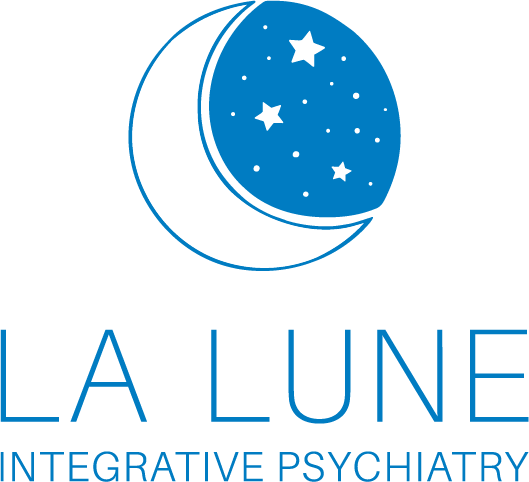From Restless Nights to Restful Sleep: Understanding Insomnia and Anxiety
Medically Reviewed by Elita Wong, PMHNP-BC
Sleep is often the first thing to go when stress, anxiety, or mood changes enter our lives. Whether you’re lying in bed unable to fall asleep, waking in the middle of the night, or having vivid dreams and nightmares—poor sleep can deeply affect both your mental and physical health.
In this article, we’ll walk through:
Common types of sleep disturbance
What might be driving them biologically and emotionally
How a holistic psychiatric approach can help you reclaim restorative rest
Common Types of Sleep Disturbances
Here are some of the patterns we see most often at our practice (and you might recognize one or more of them yourself):
Trouble Falling Asleep (Initial Insomnia)
Many people with anxiety experience racing, repetitive thoughts the moment their head hits the pillow. Others are physically exhausted, but mentally wide awake. These patterns may be linked to generalized anxiety, stress, or mood imbalances—and identifying the root cause is key to treatment.Middle-of-the-Night Waking (Maintenance Insomnia)
Many clients report the ‘middle-of-the-night’ wake-up around 2-3 a.m.—in our clinical experience this often ties back to stress or mood shifts interrupting the deeper sleep cycle.Early-Morning Awakening
With depression or circadian rhythm changes, you might wake earlier than usual and feel unable to go back to sleep. This pattern disrupts your day and erodes your resilience.Anxiety Dreams, Nightmares & Fragmented Sleep
Disturbing dreams, vivid replay of stressful memories, or nightmares can prevent deep, restorative sleep. For individuals with trauma history, the nervous system may stay locked in a hyperaroused state even during “sleep.”Non-Restorative or Fragmented Sleep
Even if you sleep for eight hours, you might wake feeling drained. This could stem from medication effects, misaligned circadian rhythms, or chronic stress keeping your body in “repair mode” rather than “rest mode.”
Why These Patterns Matter
When sleep is disrupted, the ripple effects are profound:
Mood regulation suffers (you may feel more irritable, low, or anxious)
Cognitive function declines (forgetfulness, brain fog, difficulty focusing)
Physical health suffers (immune function, metabolism, hormone balance)
Your resilience to stress decreases, making sleep even harder to restore
How a Holistic Psychiatric Approach Helps
Instead of treating insomnia as just “can’t sleep,” we view it as a window into whole-body health. At our practice, a personalized plan might include:
A comprehensive psychiatric evaluation to identify underlying anxiety, depression, seasonal, biological, environmental, or trauma factors.
Lab work to check for biochemical causes of insomnia (e.g., thyroid issues, hormonal imbalances, nutrient deficiencies).
Medication management when appropriate, combined with mindfulness, relaxation training, or cognitive interventions.
Lifestyle and circadian rhythm support: guidance on light exposure, nutrition, exercise, and daily timing to reset healthy sleep patterns.
Collaboration with therapists, sleep centers, or your primary-care provider to ensure the emotional and physical sides of sleep disturbance are both addressed.
In other words, instead of simply sedating symptoms, we support your body and mind in restoring balance—improving sleep, energy, focus, and distress tolerance.
Getting Started: What to Expect
If you’re ready to take action, the process typically looks like this:
Intake & Matching: You fill out a brief intake form so we can match you with the right provider based on your sleep concerns and overall needs.
Insurance & Scheduling: We verify your insurance benefits (we accept most commercial plans) or help you with out-of-network options, then book your appointment.
Secure Appointment: You meet your provider via telehealth or in-person depending on availability—focused, confidential, and targeted to your sleep concerns.
Final Thoughts
Quality sleep is the cornerstone of emotional resilience and brain health. If you’re lying awake, waking before dawn, or chronic tired even after ‘sleeping enough’, here’s one thing to remember: you don’t have to go it alone. We’ll help you explore why your rest is disrupted, and build a lasting plan to restore true refreshment.
If you’re in Washington, Oregon, Colorado, Arizona, or New Hampshire and ready to explore how to improve your sleep, we’re here, we accept most insurance and we can get you started quickly. Your body—and your mind—will thank you.
Ready to take the next step toward better sleep? Fill out our 5-minute intake form, check your insurance benefits, and book your appointment. Because high-quality sleep isn’t just about more hours—it’s about better rest.
Disclaimer: This website does not provide medical advice and may be out of date. The information, including but not limited to text, PDFs, graphics, images, and other material contained on this website are for general educational purposes only. No material on this site is intended to be a substitute for professional medical advice, diagnosis, or treatment, and does not create a patient-doctor relationship. Always seek the advice of your qualified healthcare provider with any questions you may have regarding a medical condition, lifestyle or dietary changes, treatments, and before undertaking a new health care regimen. Never disregard professional medical advice or delay in seeking it because of something you have read on this website.




